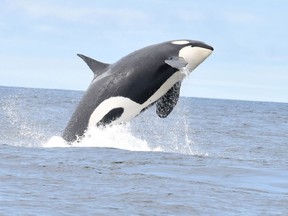Drone footage shows five orcas chasing and killing a great white
Author of the article:
The Telegraph

In the placid seas off the coast of Mossel Bay in South Africa, a vicious power struggle is emerging between two of the world’s deadliest predators.
Killer whales have been filmed hunting great white sharks in an hour-long killing spree resulting in an orca, known as Starboard, appearing to tear out and eat the liver of its prey.
Sign up to receive the daily top stories from the National Post, a division of Postmedia Network Inc.
Thanks for signing up!
A welcome email is on its way. If you don't see it, please check your junk folder.
The next issue of NP Posted will soon be in your inbox.
For several years great whites have been washing up on the South African coast missing livers and hearts, but this is the first direct evidence that killer whales are responsible.
https://www.youtube.com/watch?v=aK0iqgO
Drone footage showed five orcas chasing and killing a great white. Experts suspect another three sharks may have been killed in the attack.
-

Dutch sailor films a rare all-white whale off the coast of Jamaica
-

The killer whale has unseated the great white shark as the ocean's most feared predator, study finds
“This behaviour has never been witnessed in detail before and certainly never from the air,” said the lead author Alison Towner, a doctoral candidate at Rhodes University, South Africa, who published the findings in the journal Ecology.
Killer whales are the largest member of the dolphin family but were originally named “whale killer” by sailors who spotted them hunting whales in large groups.
Experts believe that the change in behaviour may be related to a decline in other fish and sharks, forcing the orcas to alter their feeding habits.
The footage showed how sharks attempting to evade capture by circling the orca to keep it in view. However, orcas are social and hunt in groups, making the circling strategy ineffective.


